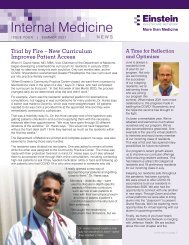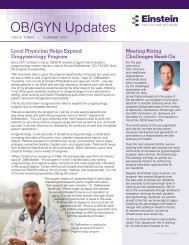0008-02-21 Einstein Orthopedics Updates NL_021821 (1)
You also want an ePaper? Increase the reach of your titles
YUMPU automatically turns print PDFs into web optimized ePapers that Google loves.
Orthopedic Medicine<br />
ISSUE ONE | SPRING 2<strong>02</strong>1<br />
UPDATE<br />
Caption: Orthopedic residents Sarah Low, MD (left) and Blake Turvey, MD<br />
(right) train with Department Chairman James S. Raphael, MD (center).<br />
Evolving for the Future<br />
From robotic surgery and orthobiologics to 3D printing and imaging, the<br />
field of orthopedic medicine has evolved in exciting new ways over the past<br />
20 years. As the field has progressed, so too has resident education. <strong>Einstein</strong><br />
Healthcare Network’s Orthopedic Residency Program is clear proof of<br />
this evolution.<br />
“So much has changed over the past two decades, I doubt our alumni<br />
from years ago would even recognize our program today,” says James<br />
S. Raphael, MD, Chairman of the Department of Orthopedic Surgery.<br />
According to Dr. Raphael, location is a good place to start. He shares that<br />
when he joined the program in 2000, the residency was based fully at the<br />
hospital. “Now we offer rotations at St. Christopher’s Hospital for Children,<br />
Shriners’ Hospital for Children in Philadelphia, MossRehab, Center One<br />
Surgery Center, Willowcrest, our two sister hospitals in Elkins Park and<br />
Montgomery County, and at our offices in Holmesburg, Collegeville, and<br />
King of Prussia,” he says. “Likewise, the growth of the network has led to an<br />
increase in case volume. We used to perform 900 cases a year, now we’re<br />
doing 5,000.”<br />
Even the number of residents accepted each year has increased with the<br />
recent approval of a 15-resident program. This year we’ll be accepting three<br />
residents a year instead of two.<br />
Additionally, the department’s focus on sub-specialization has helped expand<br />
the depth and breadth of the resident experience, making it a popular choice<br />
for trainees. “Our attending physicians are board-certified, fellowship-trained<br />
specialists,” he explains. “This means residents are exposed to all aspects<br />
of orthopedic care across all specialties—hand and foot, upper extremity,<br />
surgery, spine, oncology and joint replacement.”<br />
It’s this last area Dr. Raphael is especially excited about. “Robotic surgery—<br />
specifically hip and knee replacement, partial knee replacement and spine—<br />
is a new service we’re offering patients in 2<strong>02</strong>1,” he says. “We’ve also added<br />
anterior hip replacements to help expand our outpatient joint program.”<br />
The Importance<br />
of Connections<br />
If the COVID-19<br />
pandemic has taught<br />
us anything, it’s<br />
the importance of<br />
building and nurturing<br />
connections with one<br />
another. In this spirt,<br />
we have launched<br />
our inaugural issue of<br />
Orthopedic Medicine<br />
Update. Through this<br />
newsletter, my hope is to engage with our<br />
hundreds of alumni across the country and<br />
around the world to exchange ideas, garner<br />
support, and create a vibrant network<br />
focused on the future of our profession.<br />
As you’ll read in this issue, our department<br />
has come a long way in recent years.<br />
New clinical services, additional practice<br />
locations, a competitive residency program,<br />
and board pass rates among the nation’s<br />
highest are all things that should make you<br />
immensely proud.<br />
Yet, as is often the case, with success<br />
comes challenge.<br />
Changes in government oversight and,<br />
more specifically, the ways in which we<br />
can fund our residency programs has<br />
presented challenges as we work to<br />
support our residents. As graduates of our<br />
program, we hope to count on you, our<br />
alumni community, to help us provide our<br />
current and future residents with the same<br />
outstanding experience you were afforded.<br />
Thank you to all our alumni who continue<br />
to support our program. To those of you<br />
whom we’ve not spoken with in a while,<br />
I invite you to contact me anytime. Our<br />
doors are always open, and we would love<br />
the chance to reconnect.<br />
James S. Raphael, MD<br />
Chairman, Department of Orthopedic Surgery<br />
Director, Hand and Upper Extremity Surgery<br />
<strong>Einstein</strong> Healthcare Network<br />
<strong>21</strong>5-456-6051 | RaphaelJ@einstein.edu<br />
continued on page 2
<strong>Orthopedics</strong> Residency Program Director<br />
Gene Shaffer, MD (right) meets with<br />
residents during their morning conference.<br />
Perfect Board Certification<br />
Streak Nine Years Running<br />
The fundamental mission of any residency program is to shape<br />
knowledgeable, technically-sound, thoughtful practitioners.<br />
Perhaps the most basic measure of that undertaking is the<br />
board certification pass rate. Since 2011, one hundred percent<br />
of <strong>Einstein</strong>’s orthopedic residents have passed their board<br />
certification.<br />
Gene Shaffer, MD, the <strong>Orthopedics</strong> Residency Program<br />
Director, credits the achievement to the immersive nature of<br />
the residency program, which accepts two new residents each<br />
year, and its “robust” educational curriculum.<br />
“It’s a relatively small residency, but I believe that benefits<br />
our residents because they’re involved in the complete care<br />
of our patients, including logging time in the OR, from very<br />
early on in their training,” he says. “We also have a very strong<br />
educational didactic which includes a daily conference.<br />
Essentially, we’re immersing them in orthopedics from the first<br />
day of their training, and every day thereafter.”<br />
As further evidence of the value of the educational experience,<br />
Dr. Shaffer points to the residents’ recent performance on the<br />
annual American Academy of Orthopaedic Surgeons (AAOS)<br />
Orthopaedic In-Training Examination. The comprehensive,<br />
computer-based exam is designed to “facilitate knowledge<br />
assessment in established principles and conventional<br />
procedures and treatment modalities in orthopaedic surgery,”<br />
according to the AAOS. Basically, it’s treated as a boardcertification<br />
prep test.<br />
Among U.S. orthopedic residency programs, the exam is the<br />
most widely used of its kind. The 2019 exam was administered<br />
to 5,110 residents across 238 national and international<br />
residency programs, according to the AAOS.<br />
From 2012 to 2017, according to Dr. Shaffer, <strong>Einstein</strong>’s<br />
<strong>Orthopedics</strong> residency was the top-ranked program in the<br />
country, based on its performance on the exam. And for<br />
the last seven years, it’s placed above the 95th percentile.<br />
(Rankings are determined by the aggregate score of a<br />
program’s residents, Dr. Shaffer says.)<br />
“Our program is resident-run and attending-supervised, so<br />
this achievement belongs wholly to the residents themselves,”<br />
Dr. Shaffer says. “Their continued success is a testament to their<br />
determination and the diverse program we’ve developed here.”<br />
2 | Spring 2<strong>02</strong>1 | Orthopedic Medicine Update<br />
continued from page 2<br />
Evolving for the Future<br />
Other additions to the department include a research<br />
lab which conducts basic and clinical research, and a<br />
regenerative medicine program. A full-time orthopedic<br />
traumatologist has also been brought onboard to help<br />
enhance the department’s trauma services.<br />
“One final thing I think is important to mention is the diversity<br />
of our staff,” Dr. Raphael says. “Our community is rich with<br />
cultural and ethnic diversity and we want our staff to reflect the<br />
people whom we serve. This has been a goal over the past<br />
decade and one that we will continue to pursue into the future.”<br />
A Surgeon Finds His Calling—<br />
After a Brief Detour<br />
After five years of spending his workdays mostly confined<br />
to a cubicle, Colin Whitaker decided engineering wasn’t<br />
the career he imagined it would be and resigned. Soon<br />
after, he applied to medical school. It was a new direction<br />
for him, but not an entirely unfamiliar one. Whitaker’s father<br />
is an orthopedic surgeon.<br />
“My dad never said anything to try to persuade me to<br />
consider medical school, but he certainly influenced<br />
my decision,” says Colin Whitaker, MD, now a fifthyear<br />
resident in the Department of Orthopedic Surgery.<br />
“Ultimately, I wanted to pursue a career that interested<br />
me, but would also push me to my limits.”<br />
He appears to have found it at last. Asked to reflect on<br />
his residency so far and describe what comes to mind,<br />
Dr. Whitaker says, “How hard it was. I’ve learned so much<br />
and grown as both a person and a physician over these<br />
last five years.”<br />
Later this year, following the conclusion of his residency,<br />
Dr. Whitaker will be headed to the University of<br />
Pennsylvania for a one-year orthopedic spine surgery<br />
fellowship. He found himself gravitating to the specialty<br />
during the course of his monthly rotations at <strong>Einstein</strong>.<br />
“There are so many aspects of orthopedics that I enjoy,<br />
and by focusing on the spine, I’ll be able to do spine<br />
surgery as well as general orthopedics. Essentially, it<br />
positions me to take full advantage of my training,”<br />
Dr. Whitaker says. “I also appreciate the challenge<br />
of managing patients who are a little more complex.”<br />
At the end of his shift, during which he<br />
can spend more than 10 hours in the<br />
operating room, Dr. Whitaker hustles<br />
home to offer some much-needed<br />
support to his “very understanding<br />
and accommodating” wife—the<br />
couple has three young children<br />
who range in age from six months to<br />
six-years-old—before preparing<br />
for the next day’s cases,<br />
waking well before dawn,<br />
and starting all over again.<br />
Colin Whitaker, MD
A Residency Rich in Clinical<br />
Experience and Life Lessons<br />
Ask Scott H. Kozin, MD, what he remembers about his<br />
orthopedic surgery residency at <strong>Einstein</strong> Medical Center<br />
Philadelphia and a stream of vivid memories will follow,<br />
some describing clinical experiences and others speaking<br />
to the close camaraderie among many of the residents at<br />
the time. Both were equally influential.<br />
“I loved my residency. Clearly, I worked hard, but I also<br />
had a lot of laughs along the way,” says Dr. Kozin, who has<br />
served as Chief of Staff for Shriners Hospitals for Children—<br />
Philadelphia since 2014. He specializes in upper extremity/<br />
brachial plexus injuries, spinal cord injuries, congenital<br />
differences, and upper limb reconstruction.<br />
He is also the team leader for the Touching Hands Project,<br />
the outreach arm of the American Society for Surgery of<br />
the Hand that provides hand surgeries, rehabilitation, and<br />
medical training in the world’s underserved communities.<br />
Dr. Kozin says he developed his interest in hand surgery<br />
during his <strong>Einstein</strong> residency.<br />
“My time at <strong>Einstein</strong> instilled in me the importance of<br />
personal reflection,” he says. “Dr. Milton Wohl, our<br />
department Chairman, was a true renaissance man.<br />
He taught me to think beyond orthopedics. He said,<br />
‘You’ll need other things in life once you go into practice.’<br />
<strong>Einstein</strong> Alumnus Scott H. Kozin, MD, Chief of Staff for<br />
Shriners Hospitals for Children—Philadelphia<br />
Dr. Earl Marmar expressed similar views on life and<br />
orthopedics. Their advice proved very important, and I try to<br />
convey similar thoughts to my residents and fellows today.”<br />
This sentiment emerges in a number of Dr. Kozin’s<br />
anecdotes from his residency. He respected the doctors<br />
he studied under for their expertise, but he grew to admire<br />
many of them because they understood their lives were<br />
larger than their work. He’s tried to maintain that same<br />
mindfulness in his own practice.<br />
In the Lab, Progress is Measured in Inches<br />
With each of its 11 orthopedic surgery residents simultaneously<br />
participating in their own research, the Department of<br />
Orthopedic Surgery Bioengineering Laboratory sees a lot<br />
of traffic.<br />
The lab’s various projects, which are overseen by John<br />
Handal, MD, Director of Spine Surgery, and Solomon Praveen<br />
Samuel, PhD, encompass basic science experiments, clinical<br />
research, and case reports. Drs. Handal and Samuel develop<br />
the ideas for the experiments and research by scouring peerreview<br />
journals and then offer them up to the residents as part<br />
of their learning experience.<br />
“It’s always easier to work on a project that you’re interested<br />
in,” Dr. Handal says of the approach. He founded the lab<br />
about 10 years ago, when he was the department Chairman,<br />
along with then-Associate Chairman and now-Chairman<br />
James Raphael, MD.<br />
Current research subjects include 3D printing, prosthesis<br />
biomechanics, patient compliance, and gait. Asked how the<br />
work may influence treatment protocols within the department,<br />
Dr. Handal describes the route from “bench to the bedside”<br />
as “incremental.”<br />
“We solve one problem. Someone halfway around the<br />
world will see our finding, and they’ll take it the next inch.<br />
And it just keeps going,” he says. “Pfizer and Moderna’s<br />
COVID-19 vaccines, as an example, are the result of<br />
years, decades even, of research by many people.”<br />
That said, the lab, which is generously supported<br />
by Joan Wohl, the widow of the former department<br />
Chairman Milton Wohl, MD, has invested significant time<br />
and resources in exploring new forms of drug delivery,<br />
specifically the administration of chemotherapy drugs<br />
inside the bone.<br />
“I think that’s something that, eventually, could have a<br />
direct impact on our patient care,” Dr. Handal says.<br />
Solomon Praveen Samuel, PhD (pictured) works with<br />
John Handal, MD, to oversee the department’s various<br />
research projects.<br />
Orthopedic Medicine Update | Spring 2<strong>02</strong>1 | 3
<strong>Einstein</strong> Healthcare Network<br />
Office of Development<br />
Braemer Education Building<br />
5501 Old York Road | Philadelphia, PA 19141<br />
Have exciting news to share?<br />
Want to keep up with fellow <strong>Einstein</strong><br />
alumni? Or need to send us your<br />
updated contact information?<br />
Please drop a note to Fran Gress,<br />
Manager of Annual Fund and Alumni<br />
Relations at gressfra@einstein.edu<br />
or call <strong>21</strong>5-456-6278. Or share your news<br />
at advance.einstein.edu/alumni.<br />
The Day <strong>Einstein</strong> Earned All the Bragging Rights<br />
While a medical student doing a rotation in the <strong>Einstein</strong><br />
Department of Orthopedic Surgery, Michael Narvaez, MD,<br />
had appreciated the way the residents cultivated a strong<br />
sense of teamwork. Once he became one of those residents,<br />
contributing to that culture became a point of pride for him.<br />
So, there couldn’t have been a more fitting culmination to<br />
Dr. Narvaez’s residency than when he won, in 2019, the<br />
20th annual John R. Gregg Memorial Resident Bowl, a first<br />
for <strong>Einstein</strong>.<br />
<strong>Einstein</strong> is perennial participant in the Philadelphia<br />
Orthopaedic Society’s monthly lecture series, which it hosts<br />
for residents and attendings of the city’s seven orthopedic<br />
residency programs. At the final gathering, a fifth-year<br />
resident from each program competes in a knowledge test.<br />
The “resident bowl” is awarded to the winner.<br />
Needless to say, a torrent of bragging rights is attached to<br />
the award.<br />
“I tell people all the time that <strong>Einstein</strong>’s orthopedics program<br />
is the best-kept secret in Philadelphia,” says Dr. Narvaez,<br />
4 | Spring 2<strong>02</strong>1 | Orthopedic Medicine Update<br />
a former chief resident. “To be able<br />
to win the resident bowl and draw<br />
some attention to the department is<br />
something that meant a lot to me, and<br />
still does.”<br />
He credits the daily fracture<br />
conferences with molding him into the<br />
surgeon he is today. “With so few Michael Narvaez, MD<br />
residents, you’re on the spot all the<br />
time as a junior resident,” Dr. Narvaez says. “That constant<br />
pressure is what I needed. It lit a fire under me. In practice<br />
now, I strive to stay on top of the literature so that I never<br />
encounter a situation where I feel unprepared.” He adds that<br />
the unique diversity of cases he faced during his residency<br />
gave him the confidence to perform complex surgeries.<br />
Following his residency, Dr. Narvaez completed a sports<br />
medicine fellowship at the Cedars-Sinai Kerlan-Jobe<br />
Orthopaedic Clinic in Los Angeles, which included serving<br />
as the assistant team physician for a number of the city’s pro<br />
sports and college teams. In October, he joined the Anderson<br />
Orthopaedic Clinic in Virginia.<br />
Supporting <strong>Einstein</strong> Healthcare Network’s Orthopedic Medicine Program<br />
Gifts to support <strong>Einstein</strong> Healthcare Network’s Orthopedic Medicine Program<br />
directly impact the training and well-being of our residents. You may make your<br />
tax-deductible gift in support of the program by donating online to <strong>Einstein</strong>’s<br />
Orthopedic Fund at advance.einstein.edu/alumni or calling <strong>21</strong>5-456-6278.<br />
Office of Development<br />
Braemer Education Building<br />
5501 Old York Road<br />
Philadelphia, PA 19141


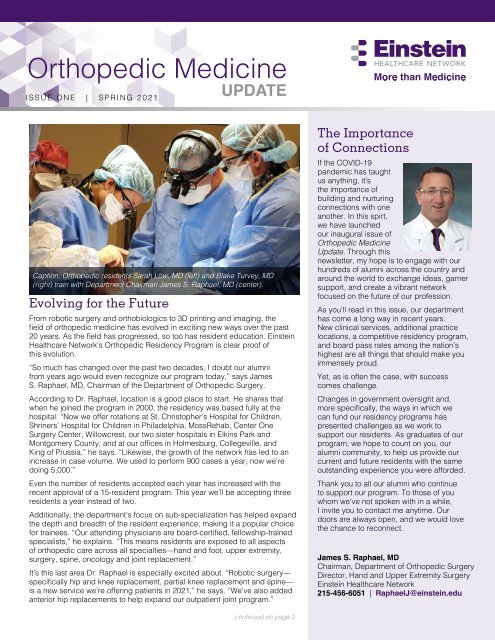
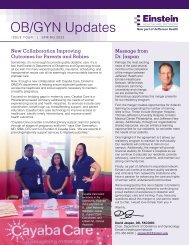
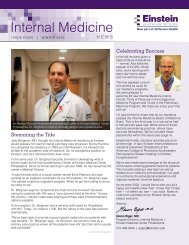
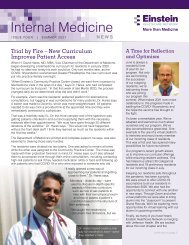
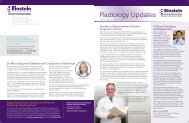

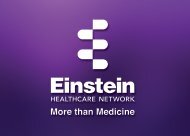
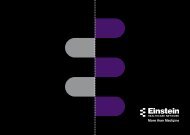
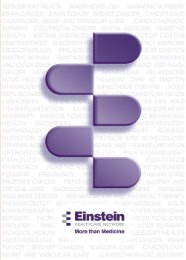
![Donor_Impact_Report_2019[1]](https://img.yumpu.com/65872065/1/186x260/donor-impact-report-20191.jpg?quality=85)



